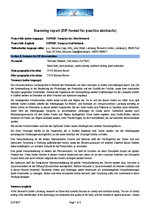Scanning Report Y2 on "Stone fruit Variety Testing"
At the Research Centre Laimburg, research on Stone fruit currently focuses on variety and rootstock testing. The aim of Variety testing is the identification of the phenology, the production and quality of the fruits, and the resistance against diseases. Variety testing is conducted in order to come up with recommendations for the growers. The predominant Stone fruits cultivated in South Tyrol are cherries and apricots.Kordia and Regina are the two main cherry varieties grown in South Tyrol. As these are medium and late-maturing varieties respectively, the working group for Berries and Stone fruit at the Research Centre Laimburg is looking for early varieties as alternatives to these predominant varieties. The mid season variety Kordia faces some problems related to replant disease. Therefore, the working group is executing tests with different rootstocks for Kordia. Finally, pollination-trials were conducted with the varieties Regina and Kordia. Kordia flowers pollinized with Regina pollen resulted in higher fruit set than the control which was pollinated naturally.
As with cherries, the central research subjects in the context of apricots are also varieties and rootstocks.
The variety Vinschger is the predominantly cultivated apricot variety in South Tyrol. Therefore, the working group conducted pomological tests with this variety in order to find the best selection.
A challenge for the both predominantly cultivated stone fruits is represented by spring frost. Increased research towards late flowering varieties together with knowledge-exchange with other experts of the field are crucial, in order to prevent severe losses to the growers due to frosts.
The major challenges the working group is facing in its research are related to plant protection. Regarding cherries, the central problem represents Drosophila Suzukii. Early varieties might be interesting if they mature before the presence of Drosophila Suzukii in order to reduce losses due to the insect.
In the context of apricots, the European Stone Fruit Yellow (ESFY) poses the major challenge. Currently, research on ESFY is conducted in collaboration with the Edmund Mach Foundation. More research in this regard in collaboration with other institutes is essential.
Resistant varieties and rootstocks would be interesting in order to manage the severe challenges represented by diesaeses. Up to now, no resistant varieties are known, but research should go increasingly in this direction.
Documents

|
Scanning Report Y2 on "Stone fruit Variety Testing" () |
Details
- Activity type
- Publication of scanning report
- Activity work package
- Performance of new fruit varieties
- Activity number
- Laimburg-WP2-A91
- Activity contact
- Walter Guerra
Laimburg Research Centre
Laimburg 6 - Pfatten
I-39040 Post Auer (BZ), Italy
[email protected] - Activity partner
- Laimburg
- Activity country
- Italy
- Last edit
- 19-07-2019

The EUFRUIT thematic network has received funding from the
European Union's Horizon 2020 research and innovation programme
under grant agreement No 696337.
European Union's Horizon 2020 research and innovation programme
under grant agreement No 696337.